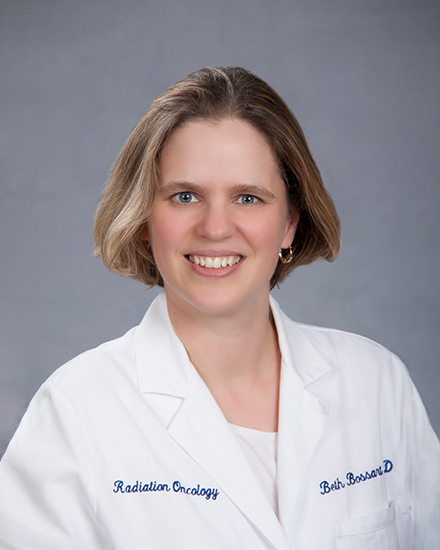Volunteer Spotlight: No Longer ‘All Over the Map,’ Her Exam Questions Are Now on Point
By Rodney Campbell, ABR Communications Manager
April 2024;17(2):10

An educator herself, ABR volunteer Elizabeth (Beth) Bossart, PhD, has learned several lessons as an Online Longitudinal Assessment (OLA) question writer and Initial Certification oral examiner.
As is the case with most question writers, developing the right formula was a struggle at first. Dr. Bossart’s early attempts required assistance from her more experienced fellow committee members. After a few tries, she found the key.
“The original group of questions that I wrote were all over the map,” she said. “Now, when I write questions, it’s a much simpler process. I start from what it is I’m trying to figure out and work backward rather than write a question and see where it goes.”
Dr. Bossart is an associate professor of clinical radiation oncology at the University of Miami’s Miller School of Medicine. She says that developing therapeutic medical physics questions for OLA participants also helps her in the classroom.
“I teach graduate classes, so it’s been very useful to my regular life to learn how to write and edit,” she said. “Editing was easier than writing.”
All ABR question-writing committees work as teams to produce fair and relevant questions for the audience. For OLA, the goal is writing questions that don’t require studying. That requires a mix of volunteers who represent academic and clinical practices.
“Sometimes, my level of walking-around knowledge is a little different,” Dr. Bossart said. “It’s nice to have volunteers who are more clinical because they help me learn. If there’s something that you really don’t do, somebody on the committee always has a little more specialized knowledge of the subject. I learn something every time we have a committee meeting.”
She served as an oral examiner in 2021. In addition to the ABR-provided training, Dr. Bossart had experience giving mock oral exams to residents, which allowed her to come into the exam feeling confident. In this case, both the examiners and examinees enter better prepared.
“I think having that experience of doing it on a regular basis with residents helps when I give an exam because I feel like I already know the process,” she said.
Her work as an examiner is to discern how much the examinee knows about the subject matter. Dr. Bossart remembers being on the other side of the process as an examinee; she earned her initial certification in 2003 after her residency at the University of Florida.
She believes that it’s important to keep examinees from straying too far from the subject or overexplaining their answers. Simply put, an oral exam is just two people talking.
“When you examine somebody, you want to get them calm because most of them are nervous,” she said. “You try to reassure people that this is a conversation and that they should just focus on the moment and not worry so much about passing or not passing.”
Dr. Bossart took her oral exam in Louisville, a rite of passage for many physicians and physicists who have earned initial certification over the years. She was living in Miami at the time and her parents, who were headed to Ohio from Houston when she was taking the exam, thought it would be a good opportunity to stop in and see her.
“I told them that I wasn’t going to be able to do anything with them until after the exam was over,” she said. “When I walked into the hotel lobby after my exam, my parents were there waiting for me.”
It was a happy result all the way around. Dr. Bossart saw her parents and, a couple of weeks later, learned that she was board certified. She’s never taken that accomplishment for granted and is always willing to give back as an Initial and Continuing Certification volunteer.
“It’s important to help out and be part of the process,” she said.



